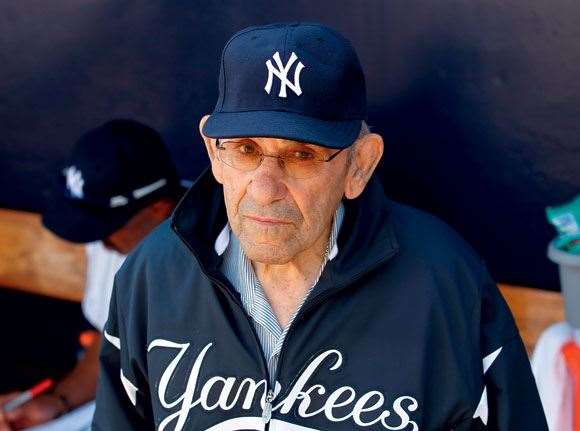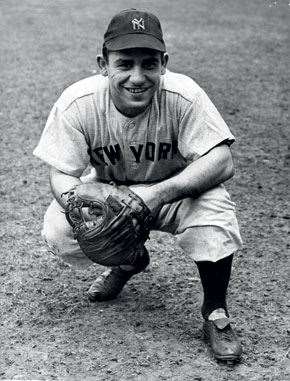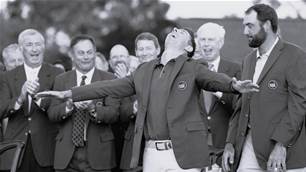Yankees catcher Yogi Berra was the no-nonsense character baseball had been waiting for. He knew a bit about the game,stumbling only on delivery to us mere mortals.
Yankees catcher Yogi Berra was the no-nonsense character baseball had been waiting for. He knew a bit about the game,stumbling only on delivery to us mere mortals.
 Still considered one of the greatest catchers of all time. Images: Getty Images
Still considered one of the greatest catchers of all time. Images: Getty ImagesSome people are innovators by sheer force of personality, infusing a sport with unforgettable character and investing it with myth and legend. Yogi Berra’s influence is greater than the sum of his parts. His down-home wisdom is extensively quoted in the US, in leadership and management books, seminars and grandly-titled publications such as The Jurisprudence Of Yogi Berra. To many outside America, his often-inadvertent contributions to our collective wisdom remain a mystery.
Not so his importance. Berra was a great player, an influential coach and manager. He wasn’t so much an innovator as an innovation. Born on May 12, 1925 in St Louis, Lawrence Peter Berra was the archetypal American success story: a hard-working, rough-edged original who always found a way. As a player, coach and manager, he took his genius for originality and turned it into success.
Berra was the ingredient baseball had always been looking for: a man of wisdom free from the constraints of “culture”; a learned man who never suffered the disadvantage of being “educated”. More than anyone, he embodied the essence of baseball and became its totem. His very name, “Yogi”, bestowed by New York Giants utility Bobby Hofman on a whim after noting he looked like a Hindu holy man, is somehow more fitting than Yogi himself would ever admit.
As a player Berra was, and still is, considered one of the greatest catchers of all time – speedy, strong, athletic – and an exceptional hitter. He was crowned American League MVP in 1951, 1954 and 1955. In 19 seasons he batted over .300 in four, and 11 times exceeded 20 home runs. Five times he had 100-plus runs-batted-in. He led the Yankees in RBIs for seven consecutive years on a team that boasted Mantle and DiMaggio.
When The Sporting News published its “25 Greatest Baseball Moments Of All Time”, the Yankees great figured in ten of those moments.
New York Yankees manager Casey Stengel was Berra’s Svengali. After an erratic time in the AAA league, Berra finally became starting catcher for the Yankees, holding the position from 1949 to 1959. During that time he perfected baseball’s version of “sledging” and was famous for his ability to distract batters. Notorious for his penchant for swinging at pitches outside the strike zone, he was still a hard man to dislodge, and in 1950 was called out on strikes only 12 times in 597 at-bats.
Altogether Berra appeared in 14 World Series for ten wins (both records), most games as catcher, most at-bats, most hits, doubles, singles, games caught, and catcher putouts. A cunning operator at bat and behind it, he scored the first pinch-hit home run in World Series history. He called three career no-hitters, the most famous being pitcher Don Larsen’s perfect game in the 1956 World Series.
Berra was an outstanding handler of great pitchers. He led the American League eight times in games caught
and chances accepted. Among his many other firsts, he was also the first catcher to leave a finger outside the glove.
After retiring as a player in 1963, Berra was a breath of fresh air in the game’s Machiavellian corridors: honest, tough, compassionate, with a gift for getting to baseball’s heart. As a coach and manager he was universally admired for his know-how, from the diamond to the dressing-room, which is why his quirky, seemingly nonsensical sayings are taken so seriously.
But his directness was heretical in baseball’s political world. He took the Yankees to the 1964 world championships, lost the series to the Cardinals, and was sacked. In 1973, as Mets manager, he took them to the National League championship after they’d been nine games out of first place. That September, when all looked lost, he made his famous observation that “it ain’t over till it’s over”. He was sacked again two years later. Following another ousting, this time after a clash with George Steinbrenner at the Yankees in 1985, he switched to the Houston Astros. Steinbrenner later confided that sacking Berra was “the worst mistake I ever made in baseball”.
 Yogi Berra in his prime. Images: Getty Images
Yogi Berra in his prime. Images: Getty ImagesRarely is one of our innovators notable for his contribution to the language, but when it comes to malapropisms and tautologies, Yogi was a master ‒ one of the most quoted figures in sporting history.
Among his gems were:
“If the world was perfect, it wouldn’t be.”
“Ninety per cent of the game is half- mental.”
“If people don’t want to come to the ballpark, nobody’s going to stop them.”
“It gets early out here.”
“Nobody goes there anymore. It’s too crowded.”
“The future ain’t what it used to be.”
“A nickel ain’t worth a dime any more.”
“When you come to a fork in the road, take it.”
“It’s deja vu all over again.”
“You can observe a lot by watching.”
“Always go to other people’s funerals, otherwise they won’t go to yours.”
These are all like Yogi himself; offbeat, yet mysteriously persuasive. Berra’s one of a kind. You can imitate him; just don’t try to be like him!
– Robert Drane
Related Articles

Feature Story: Moving the Needle

The Aussies at The Open













